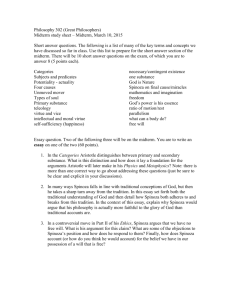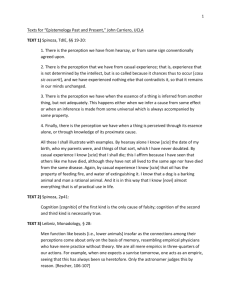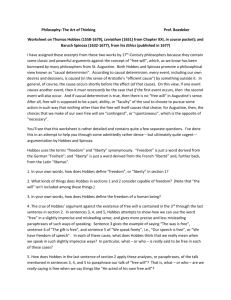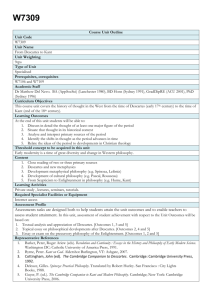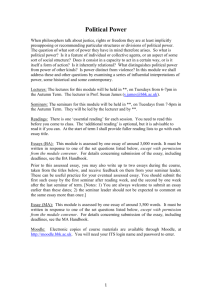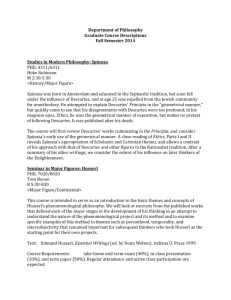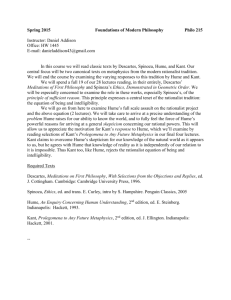Syllabus - jeremy dunham
advertisement
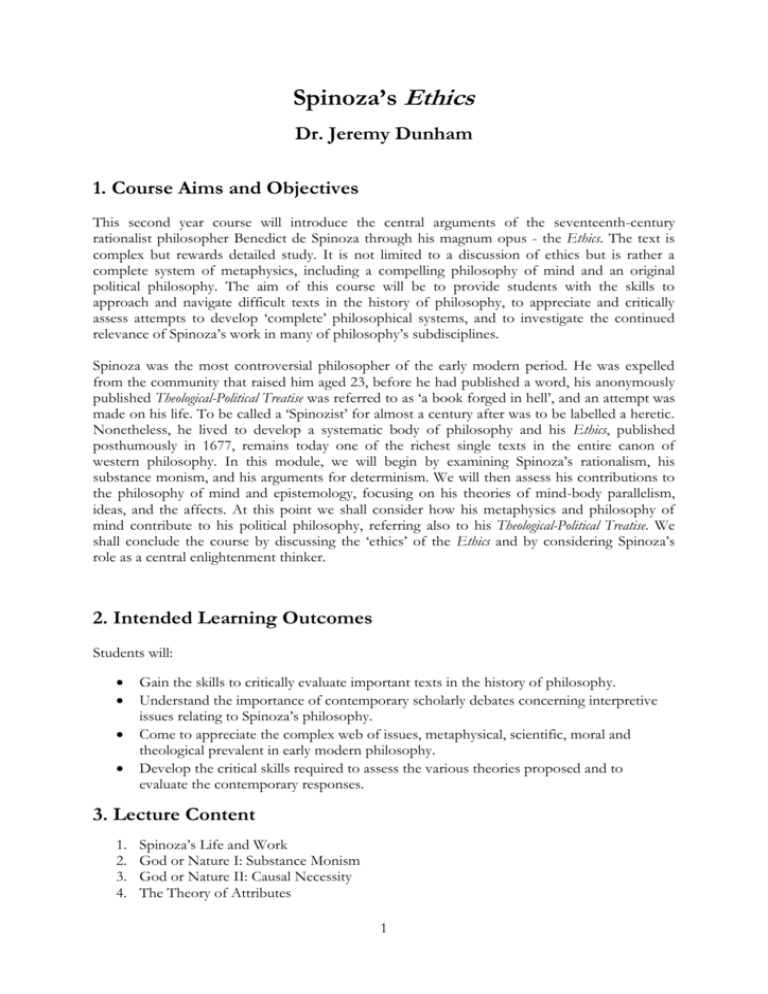
Spinoza’s Ethics Dr. Jeremy Dunham 1. Course Aims and Objectives This second year course will introduce the central arguments of the seventeenth-century rationalist philosopher Benedict de Spinoza through his magnum opus - the Ethics. The text is complex but rewards detailed study. It is not limited to a discussion of ethics but is rather a complete system of metaphysics, including a compelling philosophy of mind and an original political philosophy. The aim of this course will be to provide students with the skills to approach and navigate difficult texts in the history of philosophy, to appreciate and critically assess attempts to develop ‘complete’ philosophical systems, and to investigate the continued relevance of Spinoza’s work in many of philosophy’s subdisciplines. Spinoza was the most controversial philosopher of the early modern period. He was expelled from the community that raised him aged 23, before he had published a word, his anonymously published Theological-Political Treatise was referred to as ‘a book forged in hell’, and an attempt was made on his life. To be called a ‘Spinozist’ for almost a century after was to be labelled a heretic. Nonetheless, he lived to develop a systematic body of philosophy and his Ethics, published posthumously in 1677, remains today one of the richest single texts in the entire canon of western philosophy. In this module, we will begin by examining Spinoza’s rationalism, his substance monism, and his arguments for determinism. We will then assess his contributions to the philosophy of mind and epistemology, focusing on his theories of mind-body parallelism, ideas, and the affects. At this point we shall consider how his metaphysics and philosophy of mind contribute to his political philosophy, referring also to his Theological-Political Treatise. We shall conclude the course by discussing the ‘ethics’ of the Ethics and by considering Spinoza’s role as a central enlightenment thinker. 2. Intended Learning Outcomes Students will: Gain the skills to critically evaluate important texts in the history of philosophy. Understand the importance of contemporary scholarly debates concerning interpretive issues relating to Spinoza’s philosophy. Come to appreciate the complex web of issues, metaphysical, scientific, moral and theological prevalent in early modern philosophy. Develop the critical skills required to assess the various theories proposed and to evaluate the contemporary responses. 3. Lecture Content 1. 2. 3. 4. Spinoza’s Life and Work God or Nature I: Substance Monism God or Nature II: Causal Necessity The Theory of Attributes 1 5. 6. 7. 8. 9. 10. The Theory of Ideas Spinoza’s Philosophy of Mind The Theory of Affects Spinoza and the Virtuous Life Spinoza and Political Philosophy Spinoza and the Love of God 4. Assessment Information The course will be assessed by one mid-semester literature search and review (30%) and an essay of 5,000 words to be submitted at the end of the semester (70%). The literature search and review should be on the same aspect of the philosopher's thought as the essay. Essay titles: Choose one of the questions pertaining to the seminars. If you would like to write your own question, please confirm it with me first. 5. Seminar Outline 1. Spinoza’s Life and Work Reading: Nadler, S. (2006) Spinoza’s Ethics: An Introduction, Chapters 1 & 2 Extra Readings: Nadler, S. (1999) Spinoza: A Life 2. God or Nature I: Substance Monism Question: Does Spinoza provide convincing arguments to defend his substance monism? Reading: Spinoza, Ethics, pp. 1-15 (From I. D1 to the end of P17) Nadler, S. (2006) Spinoza’s Ethics: An Introduction, Chapter 3 Further Reading: Bayle, P. ‘Spinoza’. In: Historical and Critical Dictionary, pp. 288-338 Bennett, J. (1984) A Study of Spinoza’s Ethics, Chapter 3 Curley, E. (1988) Behind the Geometrical Method, Chapter 1 Della Rocca, M. (2002) ‘Spinoza’s Substance Monism’. In: Olli Koisinen and Della Rocca, M. (2008) Spinoza, Chapter 2 pp. 33-69 John Biro (eds.) Spinoza: Metaphysical Themes, pp. 38-59 Carriero, J. (2002) ‘Monism in Spinoza’. In: Olli Koisinen and John Biro (eds.) Spinoza: Metaphysical Themes, pp. 38-59 Hart, A. (1983) Spinoza’s Ethics: Part I & II, Chapter 1 Mason, R. (1986) ‘Spinoza on the Causality of Individuals’. Journal of the History of Philosophy, 24: 197–210. Phemister, P. (2006) ‘Spinoza’s God’ & ‘The One and the Many’, The Rationalists, pp. 80131 2 Viljanen, V. (2009) ‘Spinoza’s Ontology’. In: The Cambridge Companion to Spinoza’s Ethics, pp. 56-78 3. God or Nature II: Causal Necessity Question: Must Causal Determinism follow from Spinoza’s Substance Monism? Reading: Spinoza, Ethics, pp. 16-31 (I. P18 to the end of Book I) Nadler, Chapter 4 Further Reading: Curely, E. (1969) Spinoza’s Metaphysics, Chapter 2 Della Rocca, M. (2008) Spinoza, Chapter 2 pp. 69-88 Griffin, M.V. (2008) ‘Necessitarianism in Spinoza and Leibniz’. In: Huenemann, C. (ed.) Interpreting Spinoza, pp. 71-93 Jarret, C. (2009) ‘Spinoza on Necessity’. In: The Cambridge Companion to Spinoza’s Ethics, pp. 118-139 Koistinen, O. (2002) ‘Causation in Spinoza’. In: Olli Koisinen and John Biro (eds.) Spinoza: Metaphysical Themes, pp. 60-72 4. The Theory of Attributes Question: Does Spinoza’s theory of Parallelism successfully counter the Cartesian problem of interaction? Reading: Spinoza, Ethics, pp. 31-45 (II. D1 until [but not including] P17) Nadler, Spinoza’s Ethics, Chapter 5 Further Reading: Bennett, J. (1984) A Study of Spinoza’s Ethics, Chapter 6 Curley, E. (1988) Behind the Geometrical Method, Chapter 2 Della Rocca, M. (2008) Spinoza, Chapter 3 pp. 89-118 Della Rocca, M. (1996) ‘Spinoza’s Metaphysical Psychology’. In: The Cambridge Companion to Spinoza, pp. 192-266 Donagan, A. (1980) ‘Spinoza’s Dualism’. In. Kennington, R. (ed.) The Philosophy of Baruch Spinoza, pp. 89-102 Hart, A. (1983) Spinoza’s Ethics: Part I & II, Chapter 2 Wilson, M.D. (1980) ‘Objects, Ideas and “Minds”’. In. Kennington, R. (ed.) The Philosophy of Baruch Spinoza, pp. 103-120 (Also in Ideas and Mechanism). 5. The Theory of Ideas Question: Does Spinoza present a convincing criterion of truth? Reading: Spinoza, Ethics, pp. 45-68 (II. P17 to the end of Book II) Nadler, Spinoza’s Ethics, Chapter 6 3 Further Reading: Bennett, J. (1984) A Study of Spinoza’s Ethics, Chapter 7 Della Rocca, M. (2008) Spinoza, Chapter 3, pp. 118-136 Hampshire, S. (1987) Spinoza, Chapter 3 (Also in Spinoza and Spinozism) Mark, T.C. (1972) Spinoza’s Theory of Truth Steinberg, D. (2009) ‘Knowledge in Spinoza’s Ethics. In: The Cambridge Companion to Spinoza’s Ethics, pp. 140-166 Wilson, M.D. (1996) ‘Spinoza’s Theory of Knowledge’. In. The Cambridge Companion to Spinoza, pp. 89-141 6. Spinoza’s Philosophy of Mind Question: Was Spinoza a ‘Panpsychist’? Is such a position defensible? Reading: Nadler, S. (2008) ‘Spinoza and Consciousness’ Mind. New Series, Vol. 117(467): pp. 575601 Nagel, T. (1979) ‘Panpsychism’. In: Mortal Questions, pp. 181-196 Strawson, G. (2008) ‘Realistic Monism: Why Materialism entails Panpsychism’. In. Real Materialism, pp. 53-74 Further Reading: Alison, H. (1987) Benedict de Spinoza: An Introduction, Chapter 4 Della Rocca, M. (2008) Spinoza, pp. 109-118 Freeman, A. ed. (2006) Consciousness and its Place in Nature. Nagel, T. (1999) ‘Conceiving the impossible and the Mind-Body Problem’. Philosophy. 73(285): 337-52 Strawson, G. (2008) ‘Real Materialism’. In. Real Materialism, pp. 19-52 7. The Theory of Affects Question: Is it possible to treat “human actions and appetites as if it were a question of lines planes and bodies”? Reading Spinoza, Ethics, Book III Nadler, Spinoza’s Ethics, Chapter 7 Further Reading Bennett, J. (1984) A Study of Spinoza’s Ethics, Chapters 10 & 11 Della Rocca, M. (2008) Spinoza, Chapter 4 Davidson, D. (1999) ‘Spinoza’s Causal Theory of Affects’. In: Yovel, Y. (ed.) Desire and Affect: Spinoza as Psychologist, pp. 95-112 Garrett, D. (2002) ‘Spinoza’s Conatus Argument’: In: Biro, J. & Koistinen, O. (2002) Spinoza: Metaphysical Themes, pp. 127-158 Giancotti, E. (1999) ‘The Theory of Affects in the Strategy of Spinoza’s Ethics’. In: Yovel, Y. (ed.) Desire and Affect: Spinoza as Psychologist, pp. 129-138 Schrijvers, M. (1999) ‘The Conatus and the Mutual Relationship Between Active and Passive Affects in Spinoza’. In: Yovel, Y. (ed.) Desire and Affect: Spinoza as Psychologist, pp. 63-80 4 8. Spinoza and the Virtuous Life Question: What, for Spinoza, is freedom? Reading: Spinoza, Ethics, Book IV Nadler, Spinoza’s Ethics, Chapter 8 Further Reading: Alison, H. (1987) Benedict de Spinoza, Chapter 5 Bennett, J. (1984) A Study of Spinoza’s Ethics, Chapter 13 Curley, E. (1988) Behind the Geometrical Method, Chapter 3 Della Rocca, M. (2008) Spinoza, Chapter 5 Garret, D. (1996) ‘Spinoza’s Ethical Theory’. In: The Cambridge Companion to Spinoza, pp. 267-314 James, S. (2009) ‘Freedom, Slavery and the Passions’. In: The Cambridge Companion to Spinoza’s Ethics, pp. 223-241 Kisner, M.J. (2011) Spinoza on Human Freedom Youpa, A. (2009) ‘Spinoza’s Theory of the Good’. In: The Cambridge Companion to Spinoza’s Ethics, pp. 242-257 9. Spinoza and Political Philosophy Question: What is the relationship between Spinoza’s Metaphysics and his Political Philosophy? Reading: Spinoza, Theological-Political Treatise, Chapters 16 & 20 Further Reading: Alison, H. (1987) Benedict de Spinoza, Chapter 6 Balibar, E. (2008) Spinoza and Politics: London: Verso Nadler, S. (2011) A Book Forged in Hell. Feuer, L.S. (1980) ‘Spinoza’s Political Philosophy’. In: Kennington, R. (ed.) The Philosophy of Baruch Spinoza, pp. 133-154 Levene, N. (2004) Spinoza’s Revelation, Chapter 3 Melamed, Y.Y. (2010) ‘The Metaphysics of the Theological-Political Treatise’. In: Melamed, Y.Y. & Rosenthal, M.A. (eds.) Spinoza’s ‘Theological-Political Treatise’, pp. 128-142 10. Eternity and the Love of God Question: What is the philosophical significance of ‘the intellectual love of God’? Reading: Spinoza, Ethics, Book V Nadler, Spinoza’s Ethics, Chapter 9 Further Reading: Della Rocca, M. (2008) Spinoza, Chapter 7 Garret, D. (2009) ‘Spinoza on the Essence of the Human Body and the Part of the Mind that is Eternal’. In: The Cambridge Companion to Spinoza’s Ethics, pp. 284-302 5 Hampshire, S. (2005) ‘Spinoza and the Idea of Freedom’. In: Spinoza and Spinozism Lin, N. (2009) ‘The Power of Reason in Spinoza’. In: The Cambridge Companion to Spinoza’s Ethics, pp. 258-283 6. Readings Core Texts Spinoza, B. (1996) Ethics. E. Curley (trans.). London: Penguin Spinoza, B. (2007) Theological-Political Treatise. J. Israel (ed.) & M. Silverthorne (trans.). Cambridge: Cambridge University Press Nadler, S. (2006) Spinoza’s Ethics: An Introduction. Cambridge: Cambridge University Press Selected Secondary Texts (Not exhaustive): Allison, H.E. (1987) Benedict de Spinoza: An Introduction. Revised Edition. New Haven: Yale University Press Biro, J. & Koistinen, O. (eds.) (2002) Spinoza: Metaphysical Themes. Oxford: Oxford University Press Bennett, J. (1984) A Study of Spinoza’s Ethics. Indiana: Hackett Curley, E. (1969) Spinoza’s Metaphysics. Harvard: Harvard University Press Curley, E. (1988) Behind the Geometric Method: A Reading of Spinoza’s Ethics. Princeton: Princeton University Press Della Rocca, M. (2008) Spinoza. London: Routledge Donagan, A. (1988) Spinoza. London: Harvester Freeman, A. (ed.) (2006) Consciousness and its Place in Nature. Exeter: Imprint Academic Garrett, D. (ed.) (1996) The Cambridge Companion to Spinoza. Cambridge: Cambridge University Press Garrett, D. (2003) Meaning in Spinoza’s Method. Cambridge: Cambridge University Press Hampshire, S. (2005) Spinoza and Spinozism. Oxford: Oxford University Press Hart, A. (1983) Spinoza’s Ethics: Part I & II. Leiden: E.J. Brill Huenemann, C. (2008) Interpreting Spinoza: Critical Essays. Cambridge: Cambridge University Press James, S. (2012) Spinoza on Philosophy, Religion, and Politics. Oxford: Oxford University Press Kennington, R. ed. (1980) The Philosophy of Baruch Spinoza. Washington: The Catholic University of America Press Kisner, M.J. (2011) Spinoza on Human Freedom. Cambridge: Cambridge University Press Levene, N.K. (2004) Spinoza’s Revelation. Cambridge: Cambridge University Press Mark, T.C. (1972) Spinoza’s Theory of Truth. New York: Columbia University Press Melamed, Y. (2013) Spinoza’s Metaphysics: Substance and Thought. Oxford: Oxford University Press Melamed, Y., & Rosenthal, M.A. (eds.) (2013) Spinoza’s Theological-Political Treatise: A Critical Guide. Cambridge: Cambridge University Press Nadler, S. (2009) Spinoza: A Life. Cambridge: Cambridge University Press Nadler, S. (2011) A Book Forged in Hell. Oxford: Princeton University Press Nagel, T. (1979) Mortal Questions. Cambridge: Cambridge University Press Parkinson, G.H.R. (1954) Spinoza’s Theory of Knowledge. Oxford: Oxford University Press Runes, D.D. (ed.) (1951) Spinoza Dictionary. Forward by A. Einstein. Westport, Connecticut: Greenwood Press Viljanen, V. (2011) Spinoza’s Geometry of Power. Cambridge: Cambridge University Press Yovel, Y. (1999) (ed.) Desire and Affect: Spinoza as Psychologist. New York: Little Room Press 6
